中考英语语法专题—— 系动词和情态动词
中考英语专题复习:动词考点讲解
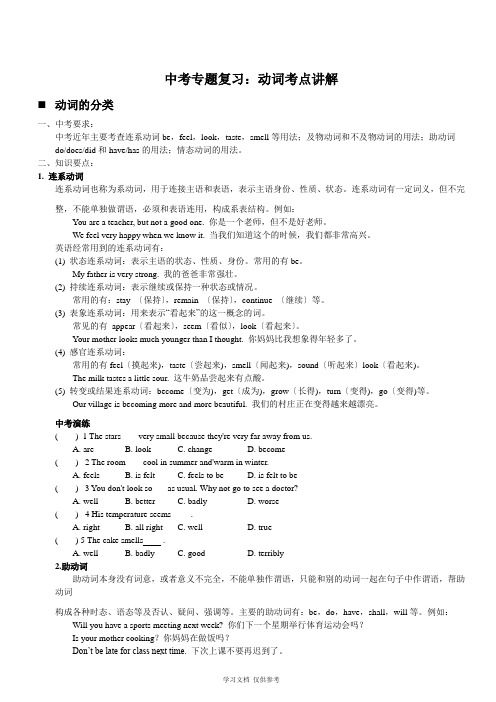
中考专题复习:动词考点讲解动词的分类一、中考要求:中考近年主要考查连系动词be,feel,look,taste,smell等用法;及物动词和不及物动词的用法;助动词do/does/did和have/has的用法;情态动词的用法。
二、知识要点:1. 连系动词连系动词也称为系动词,用于连接主语和表语,表示主语身份、性质、状态。
连系动词有一定词义,但不完整,不能单独做谓语,必须和表语连用,构成系表结构。
例如:You are a teacher, but not a good one. 你是一个老师,但不是好老师。
We feel very happy when we know it. 当我们知道这个的时候,我们都非常高兴。
英语经常用到的连系动词有:(1) 状态连系动词:表示主语的状态、性质、身份。
常用的有be。
My father is very strong. 我的爸爸非常强壮。
(2) 持续连系动词:表示继续或保持一种状态或情况。
常用的有:stay 〔保持〕,remain 〔保持〕,continue 〔继续〕等。
(3) 表象连系动词:用来表示“看起来”的这一概念的词。
常见的有appear〔看起来〕,seem〔看似〕,look〔看起来〕。
Your mother looks much younger than I thought. 你妈妈比我想象得年轻多了。
(4) 感官连系动词:常用的有feel〔摸起来),taste〔尝起来),smell〔闻起来),sound〔听起来〕look〔看起来)。
The milk tastes a little sour. 这牛奶品尝起来有点酸。
(5) 转变或结果连系动词:become〔变为),get〔成为),grow〔长得),turn〔变得),go〔变得)等。
Our village is becoming more and more beautiful. 我们的村庄正在变得越来越漂亮。
情态动词和系动词
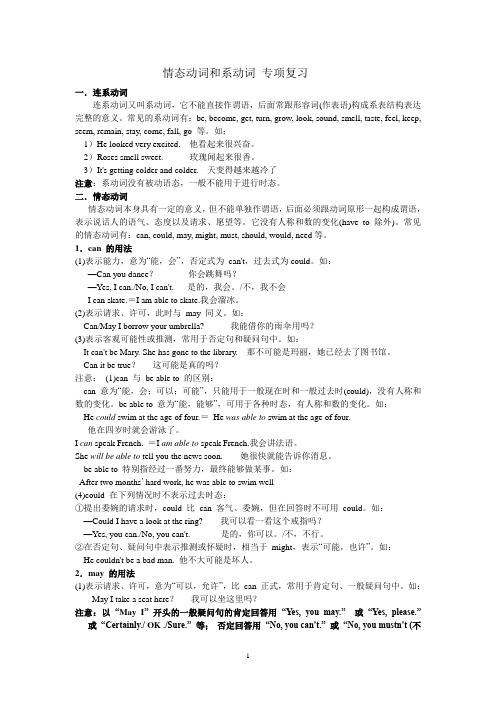
情态动词和系动词专项复习一.连系动词连系动词又叫系动词,它不能直接作谓语,后面常跟形容词(作表语)构成系表结构表达完整的意义。
常见的系动词有:be, become, get, turn, grow, look, sound, smell, taste, feel, keep, seem, remain, stay, come, fall, go 等。
如:1)He looked very excited. 他看起来很兴奋。
2)Roses smell sweet. 玫瑰闻起来很香。
3)It's getting colder and colder. 天变得越来越冷了注意:系动词没有被动语态,一般不能用于进行时态。
二.情态动词情态动词本身具有一定的意义,但不能单独作谓语,后面必须跟动词原形一起构成谓语,表示说话人的语气、态度以及请求、愿望等。
它没有人称和数的变化(have to 除外)。
常见的情态动词有:can, could, may, might, must, should, would, need等。
1.can 的用法(1)表示能力,意为―能,会‖,否定式为can't,过去式为could。
如:—Can you dance?你会跳舞吗?—Yes, I can./No, I can't. 是的,我会。
/不,我不会I can skate.=I am able to skate.我会溜冰。
(2)表示请求、许可,此时与may 同义。
如:Can/May I borrow your umbrella? 我能借你的雨伞用吗?(3)表示客观可能性或推测,常用于否定句和疑问句中。
如:It can't be Mary. She has gone to the library. 那不可能是玛丽,她已经去了图书馆。
Can it be true?这可能是真的吗?注意:(1)can 与be able to 的区别:can 意为―能,会;可以;可能‖,只能用于一般现在时和一般过去时(could),没有人称和数的变化。
中考专题复习---系动词和情态动词
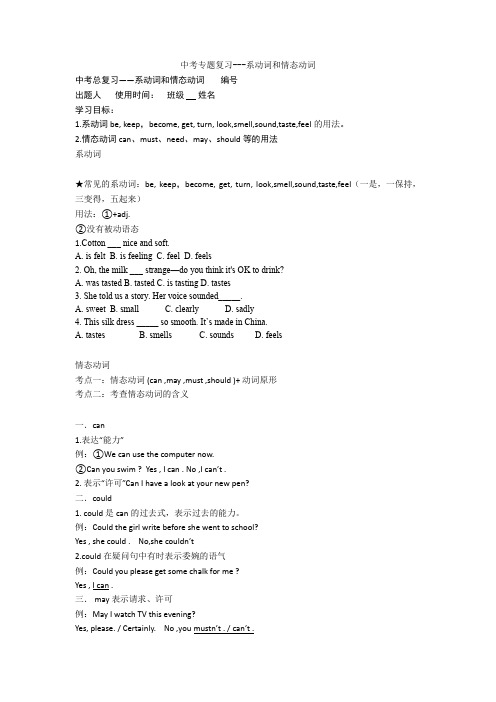
中考专题复习---系动词和情态动词中考总复习——系动词和情态动词编号出题人使用时间:班级姓名学习目标:1.系动词be, keep,become, get, turn, look,smell,sound,taste,feel的用法。
2.情态动词can、must、need、may、should等的用法系动词★常见的系动词:be, keep,become, get, turn, look,smell,sound,taste,feel(一是,一保持,三变得,五起来)用法:①+adj.②没有被动语态1.Cotton ___ nice and soft.A. is feltB. is feelingC. feelD. feels2. Oh, the milk ___ strange—do you think it's OK to drink?A. was tastedB. tastedC. is tastingD. tastes3. She told us a story. Her voice sounded_____.A. sweetB. smallC. clearlyD. sadly4. This silk dress _____ so smooth. It’s made in China.A. tastesB. smellsC. soundsD. feels情态动词考点一:情态动词 (can ,may ,must ,should )+ 动词原形考点二:考查情态动词的含义一.can1.表达“能力”例:①We can use the compu ter now.②Can you swim ? Yes , I can . No ,I can’t .2. 表示“许可”Can I have a look at your new pen?二.could1. could 是can的过去式,表示过去的能力。
例:Could the girl write before she went to school?Yes , she could . No,she couldn’t2.could在疑问句中有时表示委婉的语气例:Could you please get some chalk for me ?Yes , I can .三. may 表示请求、许可例:May I watch TV this evening?Yes, please. / Certainly. No ,you mustn’t . / can’t .四.must “必须”例:①We must do everything step by step.②You mustn’t smoke here .③--Must we hand in our homework now?--No, you needn’t. / No, you don’t have to.五.needn’t + 动词原形 (不必…)例:You needn’t worry about time . It’s early .六.should “应该”例:①The old should be spoken to politely.②You shouldn’t waste any time.考点三:情态动词表推测1. can’t “不可能”。
中考英语专项复习系动词与情态动词用法
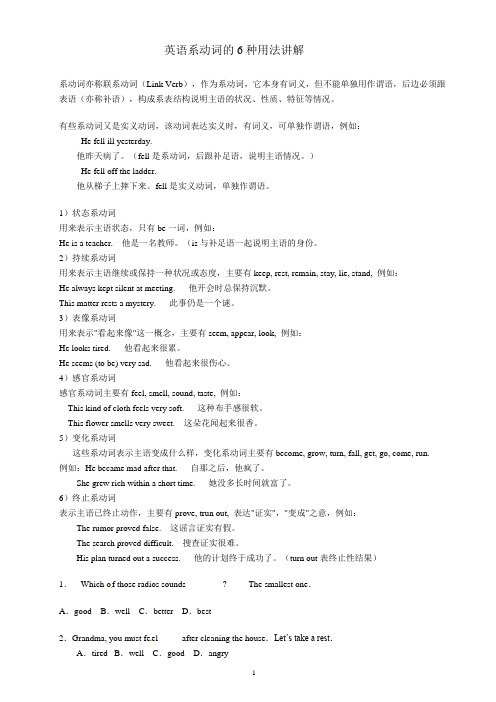
英语系动词的6种用法讲解系动词亦称联系动词(Link Verb),作为系动词,它本身有词义,但不能单独用作谓语,后边必须跟表语(亦称补语),构成系表结构说明主语的状况、性质、特征等情况。
有些系动词又是实义动词,该动词表达实义时,有词义,可单独作谓语,例如:He fell ill yesterday.他昨天病了。
(fell是系动词,后跟补足语,说明主语情况。
)He fell off the ladder.他从梯子上摔下来。
fell是实义动词,单独作谓语。
1)状态系动词用来表示主语状态,只有be一词,例如:He is a teacher.他是一名教师。
(is与补足语一起说明主语的身份。
2)持续系动词用来表示主语继续或保持一种状况或态度,主要有keep, rest, remain, stay, lie, stand, 例如:He always kept silent at meeting.他开会时总保持沉默。
This matter rests a mystery.此事仍是一个谜。
3)表像系动词用来表示"看起来像"这一概念,主要有seem, appear, look, 例如:He looks tired.他看起来很累。
He seems (to be) very sad.他看起来很伤心。
4)感官系动词感官系动词主要有feel, smell, sound, taste, 例如:This kind of cloth feels very soft.这种布手感很软。
This flower smells very sweet.这朵花闻起来很香。
5)变化系动词这些系动词表示主语变成什么样,变化系动词主要有become, grow, turn, fall, get, go, come, run.例如:He became mad after that.自那之后,他疯了。
She grew rich within a short time.她没多长时间就富了。
系动词助动词情态动词讲义
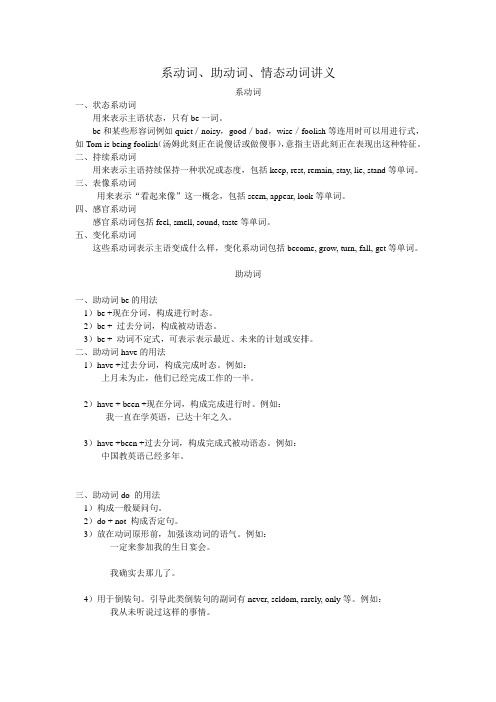
系动词、助动词、情态动词讲义系动词一、状态系动词用来表示主语状态,只有be一词。
be和某些形容词例如quiet/noisy,good/bad,wise/foolish等连用时可以用进行式,如Tom is being foolish(汤姆此刻正在说傻话或做傻事),意指主语此刻正在表现出这种特征。
二、持续系动词用来表示主语持续保持一种状况或态度,包括keep, rest, remain, stay, lie, stand等单词。
三、表像系动词用来表示“看起来像”这一概念,包括seem, appear, look等单词。
四、感官系动词感官系动词包括feel, smell, sound, taste等单词。
五、变化系动词这些系动词表示主语变成什么样,变化系动词包括become, grow, turn, fall, get等单词。
助动词一、助动词be的用法1)be +现在分词,构成进行时态。
2)be + 过去分词,构成被动语态。
3)be + 动词不定式,可表示表示最近、未来的计划或安排。
二、助动词have的用法1)have +过去分词,构成完成时态。
例如:上月未为止,他们已经完成工作的一半。
__________________________________2)have + been +现在分词,构成完成进行时。
例如:我一直在学英语,已达十年之久。
______________________________3)have +been +过去分词,构成完成式被动语态。
例如:中国教英语已经多年。
_____________________三、助动词do 的用法1)构成一般疑问句。
2)do + not 构成否定句。
3)放在动词原形前,加强该动词的语气。
例如:一定来参加我的生日宴会。
______________________我确实去那儿了。
_________________4)用于倒装句。
引导此类倒装句的副词有never, seldom, rarely, only等。
2023年中考英语语法---动词及动词短语专题复习及练习题(含答案)

2023年中考英语语法---动词及动词短语专题复习及练习题(含答案)一、动词的基本框架动词包括实义动词、系动词、助动词和情态动词。
(一)实义动词实义动词是能独立作谓语的动词。
按其句法功能可分为及物动词和不及物动词;按其持续性可分为延续性动词和非延续性动词。
1.及物动词:及物动词本身意义不完整,需要接宾语才能使其意思完整。
(1)动词+宾语I like this book very much.我非常喜欢这本书。
(2)动词+宾语+宾补We call the bird Polly.我们叫这只鸟Polly。
I saw the children play in the park yesterday.昨天我看见孩子们在公园玩。
注意:用省略to的不定式或现在分词作宾补的动词有:have,see,watch,notice,hear等。
(3)动词+间接宾语+直接宾语Please pass me the salt.请把盐递给我。
常见的带双宾语的动词有:give,bring,buy,get,leave,lend,make,offer,pass,teach,tell等。
2.不及物动词不及物动词自身意思完整,不用接宾语。
Horses run fast.马跑得快。
(1)有些动词既可作及物动词又可作不及物动词。
We study English.我们学习英语。
(及物动词)We study hard.我们努力学习。
(不及物动词)(2)有些不及物动词与一些别的词搭配在一起构成动词短语,它的作用相当于一个及物动词。
①动词+介词Listen to the teacher carefully.仔细听老师讲。
此类动词短语后面的宾语无论是名词还是代词,都只能放在介词后面,不能放在动词和介词之间。
②动词+副词+介词Let’s go on with our work!让我们继续我们的工作吧!He gets along well with his classmates.他与他的同学们相处得很好。
初中中考英语语法合集专题九 情态动词和系动词 课件

grow“渐渐变得”,
white.他感到不舒服,他的脸色
turn“转变”,go“变质”等
变得苍白。
精品教学PPT 欢迎下载 可修改哦
7
•
9、 人的价值,在招收诱惑的一瞬间被决定 。20.10.3020.10.30Friday, October 30, 2020
•
10、低头要有勇气,抬头要有低气。13:21:0913:21:0913:2110/30/2020 1:21:09 PM
have to
“不得不”,表示客观必要
I have to go to work every day. 我不得不每天工作。
精品教学PPT 欢迎下载 可修改哦
6
考点二:系动词
分类
例句及其含义
例句
表示状态
be"是",seem"似乎", We are in Grade Two this year. keep“保持”,stay“保持”等 今年我们上二年级。
can
“可以”,表示请求、允许
Can I borrow your bike? 我能借用一下你的自行车吗?
can't
“不会,不能”
“一定不,不可能”,表示 否定推测,可能性几乎为零
I can't give you an answer now. 现在我不能给你一个答案。
Miss Gao can't be in the classroom. 高老师不可能在教室里。
“应该”,表示征询意见, When should we have a meeting?
常用于疑问句
我们什么时候开会?
shouldn't “不应该”
We shouldn't waste water. 我们不应该浪费水。
初中英语2025届中考动词考点分类讲解练习(实义动词+系动词+助动词+情态动词)
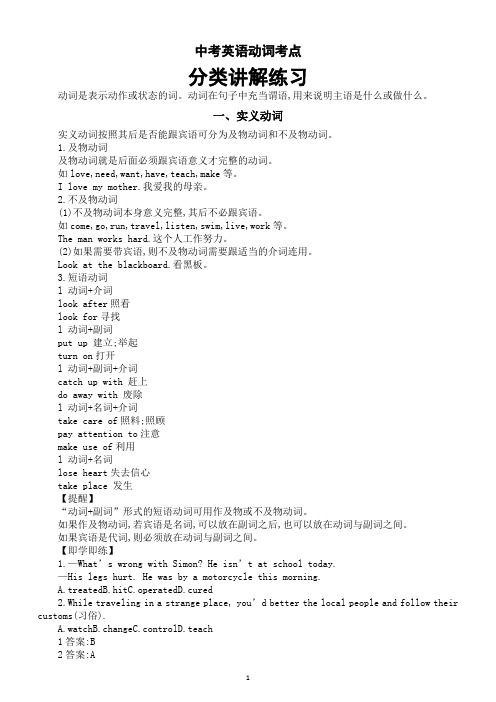
中考英语动词考点分类讲解练习动词是表示动作或状态的词。
动词在句子中充当谓语,用来说明主语是什么或做什么。
一、实义动词实义动词按照其后是否能跟宾语可分为及物动词和不及物动词。
1.及物动词及物动词就是后面必须跟宾语意义才完整的动词。
如love,need,want,have,teach,make等。
I love my mother.我爱我的母亲。
2.不及物动词(1)不及物动词本身意义完整,其后不必跟宾语。
如come,go,run,travel,listen,swim,live,work等。
The man works hard.这个人工作努力。
(2)如果需要带宾语,则不及物动词需要跟适当的介词连用。
Look at the blackboard.看黑板。
3.短语动词l 动词+介词look after照看look for寻找l 动词+副词put up 建立;举起turn on打开l 动词+副词+介词catch up with 赶上do away with 废除l 动词+名词+介词take care of照料;照顾pay attention to注意make use of利用l 动词+名词lose heart失去信心take place 发生【提醒】“动词+副词”形式的短语动词可用作及物或不及物动词。
如果作及物动词,若宾语是名词,可以放在副词之后,也可以放在动词与副词之间。
如果宾语是代词,则必须放在动词与副词之间。
【即学即练】1.—What’s wrong with Simon? He isn’t at school today.—His legs hurt. He was by a motorcycle this morning.A.treatedB.hitC.operatedD.cured2.While traveling in a strange place, you’d better the local people and follow their customs(习俗).A.watchB.changeC.controlD.teach1答案:B2答案:A二、系动词系动词不能单独作谓语,必须与表语一起构成谓语。
情态动词系动词助动词
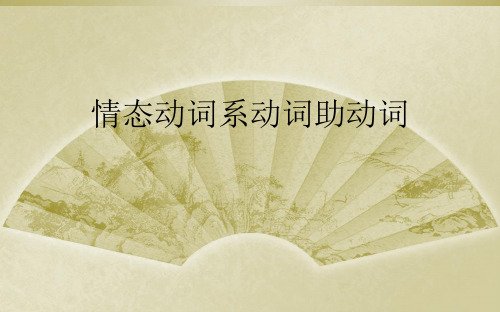
种类
例词
例句
be(是),
表状态的连系 seem(似乎),
动词
keep(保持),
stay(保持)等
look(看起来), feel(感 表示“感觉” 觉起来), smell(闻起
的系动词 来), sound(听起来), taste(尝起来)等
We are in Grade Two this year. 今年我们上二年级。
mustn’t“禁止, 不允许”; can’t“不能”; won’t“不愿
意”; needn’t“不必”。对于must开头的一般问句进行
否定回答, 常用needn’t。所以选D。
二、系动词 连系动词又称系动词, 是表示主语“是什么”或
“怎么样”的词, 它虽有词义, 但不完整, 所以不能单独 作谓语, 必须跟表语一起构成谓语。其分类如下:
5. It__________that it will rain soon. A. is B. seems C. keeps D. stays 【解析】选B。考查系动词辨析。It seems that. . . 为固 定用法, 意为“看起来……”。故选B。
三、助动词 助动词就是协助主要动词构成谓语的动词。助动
情态动词系动词助动词
一、情态动词
原形(过去式) can(could)
用法 含义
例句
表示能力(= be able to)
Tom can swim. 能; 会 =Tom is able toswim. 汤姆
会游泳。
ห้องสมุดไป่ตู้
(疑问句中)表 示请求
可以
Can you give us a hand? 你 可以帮我们一下吗?
3. —Is that girl in purple your sister —It__________be her. She’s gone to London a week before. A. can’t B. won’t C. mustn’t D. needn’t
系动词情态动词(中考考点)

考点一系动词(link-v)系动词不能独立作谓语,必须与表语一起构成谓语,称作“系表结构”。
如:I am a teacher. 我是一名老师。
常见的系动词有:be(是), look(看起来),______(似乎), appear(显得),______(觉得,摸起来), become(变得,成为),get(变得), sound(听起来),______(闻起来), taste(尝起来), turn(变得), grow(渐渐变得), keep/stay(保持), remain(保持不变)等。
考点二情态动词(mod.v)情态动词表示说话人对某一动作或状态的态度,表示“可能”、“应当”、“必要”等含义,但其本身词义不完全,不能独立作谓语,必须和动词原形连用。
情态动词没有人称和数的变化。
其否定形式一般是在情态动词后加not (have to除外),其疑问形式是将情态动词提至主语前。
情态动词数量不多,但用途广泛,主要有:can(could), may(might), must, need, shall(should), will(would)。
1.can和could的用法can(could)表示“能力”、“许可”、“可能性”等。
could 为 can 的过去式。
表示请求时,could比can 更婉转。
如:Can I use your bike?我可以用你的自行车吗?[注意] can 和could 只能用于现在时和过去时两种时态,将来时中用 be able to。
另外 can't 可表示否定推测。
如:That ______ be Mr Wang. He has gone to Beijing.那肯定不是王老师,他已经去北京了。
2.may和might的用法may(might)意为“可以”,表示说话人同意、许可或请求对方许可,也可表示祝愿。
may的否定式为may not。
might 是may 的过去式,有两种用法:一种表示过去式;一种表示虚拟语气,使语气更委婉、客气,或表示可能性更小。
中考英语冀教版第二篇 语法专题突破专题突破八 系动词和情态动词

6.The best things in life B are (be) free,like smiles,love and good memories. 7.( 2021·绥化改编)在春天,草变绿了,花出来了。 In spring,grass Bturns Bgreenand flowers come out. 8.他们想出了一个保持教室干净整洁的好办法。 They came up with a good idea to Bkeeptheir classroom clean and Btidy .
little it BB really slow. A.looked B.became C.sounded D.stayed
5.—I'm sure I will get good grades in the graduation exam. —If so,I believe your parents CD happy. A.be B.are C.were D.will be
run 等。
closed.门仍然关着。
表像类系动词 表示“看起来好像”,主要有 He seems (to be) quite
seem,look 等。
happy.他好像很开心。
表示“……起来”,有:look (看 He looks honest.他看起
起来),feel(摸起来,感觉), 来很老实。 感官类系动词
get,go,come 等。
了。
终止类系动词
主要有
prove,turn
out(结果
His advice proved sound.他的劝告证明是
是,证明是) 等。
对的。
【注意】(1)系动词没有被动语态形式。 (2)表示状态的系动词不用于进行时态。
中考复习九年级英语专题复习 题型八 情态动词和系动词

④(2016·河北押题卷)—May I do the rest of the work
tomorrow?
—Yes, of course. You ________ finish it today.
A. must
B. mustn’t
C. needn’t
【解析】选C。考查情态动词辨析。句意: ——我可以 明天做那些剩下的活吗? ——是的, 可以。你不必今天 就完成。must必须; mustn’t禁止; needn’t不需要, 不必。
【即学活用】
①—The food looked bad, but it ________ OK.
—So we can’t judge a man by his appearance.
A. is tasted
B. tasted
C. was tasted
【解析】选B。考查系动词的用法。taste是系动词“尝 起来”, 不表被动。本句意思是“食物卖相不好, 但是 尝起来却很好。”所以选择答案B。
专题八 情态动词和系动词
一、情态动词
原形(过 去式)
用法
Can 表示能力(= be (could) able to)
含义
例句
能; 会
Tom can swim.
=Tom is able to swim. 汤姆会游 泳。
原形(过 去式)
用法
含义
例句
can (could)
(疑问句 中)表示 请求
可以
②—Is that girl Susan? —It ________ be her. She left for Beijing yesterday. A. needn’t B. can’t C. mustn’t
中考英语语法专项练习题——情态动词和系动词(含答案)

中考英语语法专项练习题——情态动词和系动词1. It’s a rule that students ________ bring mobile phones to our school.A. mustn’t B, wouldn’t C. needn’t D. couldn’t2. —Must I clean my bedroom this afternoon, Mom?— No, you_______. You can do it tomorrow, dear.A. needn’tB. mustn’tC. can’tD. won’t3. —Is the woman Miss Zhao?—It _______ be her. She has gone to Qingdao for a meeting.A. can’tB. needn’tC. mustD. may4.—You ______ smoke at the oil station, it’s too dangerous.—I’m sorry, I won’t.A. couldn’tB. needn’tC. wouldn’tD. mustn’t5. The dictionary _______belong to Sam. You can see his name on it.A. canB. mustC. needD. would6. You ________ worry about her too much. She will get well soon.A. can’tB. mustn’tC. needn’tD. shouldn’t7. Sometimes the smooth surface of the lake really ________ like a mirror.A. soundsB. looksC. smellsD. tastes8. The dish smells delicious, but it ______ a little salty.A. looksB. tastesC. feelsD. sounds9. —______ I have a word with you, Mr. Green? It won’t take long.—Okay.A. ShouldB. MayC. NeedD. Must10. You ______ be very tired with the long drive. Let’s stop to have a rest.A. mustB. canC. shallD. need11. —I’ve got a toothache, mom.—Oh, you _____ eat too much candy.A. shouldn’tB. needn’tC. shouldD. need12. The man _______ be a doctor in this hospital, but I’m not sure.A. mustB. wouldC. can D might13. “Dad, my bike is broken. I use yours?”“Sure! It’s in the backyard.”A. MustB. ShouldC. May14. — The summer vacation is coming. Have you made a plan for it?—Not yet. I ______ go to Guilin.A. mayB. canC. should15. We ______ pay to get into the concert, because it’s free.A. mustn’tB. can’tC. don’t need toD. might not16. That ________be an alien—there’s no such thing!A. mightB. mustC. can’t17. He _________ like coffee. I see him drink a cup at times.A. mustB. mayC. can’tD. mustn’t18. —Look at the dark clouds, and the wind is blowing strongly.—It ______that a big storm is coming.A. soundsB. seemsC. feelsD. smells19.—Joe, don’t eat too much ice-cream.—OK, mom. But it ________ really good.A. feelsB. looksC. tastesD. sounds20. The fruit salad ______ delicious, I’d like to have more.A. tastesB. touchesC. soundsD. feels21.—Listen!Is that Linda playing the piano in the room?—No.It ______ be Linda, she has gone to London.A.may notB.needn’tC.can’tD.mustn’t22. Every one of us _______ always breathe the same breath and share the same future as the people.A.mightB. shouldC. could23. —I can’t find my phone anywhere.—You have lost it while shopping.A. mayB. canC. shouldD. would24. —Mum, may I go to see a film with my cousin?— You _______ go if you have finished your homework.A. mustB. needC. shouldD. can25. Zhao Liying, who played in Legend of Chu Qiao, says: “As an actress, you _____ behard-working.”A. canB. mayC. must26. —Whose cap is this? Is it Cindy’s?—It _________ be hers. Don’t you remember she even didn’t come to the party?A. can’tB. mightC. may notD. must27. Buses stop when the traffic lights turn red.A. canB. mayC. must28.—Some people don’t show their talents at the very beginning.—I agree. Even Einstein ________ read until he was seven.A. can’tB. mustn’tC. couldn’tD. needn’t29. The designer has tried every possible way to make the robot light, so you _______ worry about its weight.A. mustB. mayC. can’tD. needn’t30. According to the notice, guests at this hotel ______ use the sports center at no extra cost.A. canB. shouldC. mustD. need31. — Mum, it’s too hot. _______ I swim in the lake?— No, you _______. That’s too dangerous!A. Should; can’tB. Need; mustn’tC. Must; needn’tD. Could; mustn’t32. Ants are pretty small. You might think that they _______ be rather weak. But what you might not know is that ants are actually very strong for their size.A. needB. can’tC. must33. As middle school students, we ______ follow the public rules wherever we go.A. wouldB. shouldC. mightD. could34. —Is that Tom over there?—It ______ be him. He is on the plane to Chengdu now.A. can’tB. might notC. must35. —Where is Monica? I can’t find her anywhere.—She _______ be in the library. She loves reading books when she is free.A. mustB. needC. can’t36. —Look, Linda. The flowers in our classroom came out in one night.—I can’t believe it. They are beautiful and colorful. They ________ great.A. soundB. smellC. taste37. We should keep quiet in the library. We_____speak loudly.A. mustB. mustn’tC. canD. needn’t38. —Mum, may I play computer games this evening?—No way, you _________ finish your homework.A. canB. mustC. mayD. will39. You ______ walk on the wet hill path because you ______ fall and hurt yourself.A must; might not B. mustn’t; mightC. needn’t; needD. must; must40. We don’t allow taking magazines out, but you ________ copy the article you need on the machine over there.A. canB. mustC. shouldD. would41. —Lily, ______ you finish the letter in ten minutes?—Yes, I can.A. mustB. shouldC. needD. can42.Jerry didn’t pay me back, but he promised that he ______ this Sunday.A. mustB. couldC.wouldD. should43. —Is that red schoolbag Mary’s?— It ______ be hers. She hates that color.A.mayB. mustC. can’tD. might44. —______ I take the magazine out of the reading room?—I’m sorry you _______.A. Could; couldn’tB. Must; couldn’tC. Will; can’tD. May; can’t45.—Who is singing in the next room?—It _______ be Lisa, but I’m not sure.A. mustB. mayC. need46.—the beautiful lady with glasses over there looks like our English teacher.—It ______ be her. She has gone abroad.A. can’tB. may notC. Mustn’tD. needn’t47. — _______ I keep the book for a week?—Sorry, I’m afraid you ________.A. Need; couldn’tB. Need; can’tC. May; couldn’tD. May; can’t48. —Must I finish this work at once?—No, you ______.A. can’tB. won’tC. needn’t49.—Mom, may I go to the party with my friends tonight?—Yes, you . But you be back by 10:00 pm.A. can; mayB. must; have toC. may; must50. Size and type do not matter – you ______ do almost anything if you never give up.A. shouldB. mustC. needD. can51. —Kangkang, I saw your English teacher in the office just now.—It _______ be him. He ________ to Shanghai on business.A. must; has goneB. must; has beenC. can’t; has beenD. can’t; has gone52.—Will Sam go to the cinema with us tonight?—I’m not sure.He ______ not be free.A.mayB.shouldC.can53.—Will you stay here for dinner with us?—Sorry, I ________. My mother is waiting for me at home.A. mustn’tB. can’tC. needn’tD. couldn’t54. The girl in the music room ________ be Celia. She has gone to the dining hall.A. can’tB. mustC. may55. David, ________ you please sweep the floor and take out the trash?A. couldB. mayC. mightD. must56. The magazine ______ Lucy’s. We can see her name on the coverA. mustn’t beB. can’t beC. must beD. needn’t be57. Dirty air and water are harmful. They ______ kill plants, and even people.A. canB. can’tC. shouldD. shouldn’t58. — Listen! Is Sarah singing in the neighbor room?—No. It ______ be Sarah. She has gone to Italy.A. needn’tB. may notC. can’tD. won’t59. —The driver_______ be hurt badly in the accident.—That’s true. Let’s send him to the hospital as soon as possible.A. needB. can’tC. mustD. may not60.—May I join the art club, Dad?—If you have interest, you ________.A. shouldB. canC. have toD. must61. —A little bird entered through the open window to join us for dinner last night.—Wow, the unexpected guest _________ welcomed.A. will beB. must beC. won’t beD. mustn’t be62. —May I take the magazine out of the reading room?—No, you________. Please read it here.A. mustn’tB. wouldn’tC. needn’t63.—Is that boy Scott?—No, it ________ be Scott. Scott is much taller.A. canB. can’tC. mustn’t64. —Whose volleyball is this?—It _________ be Linda’s. She loves volleyballA must B. can’t C. needn’t65.— This task is really beyond me.— Well,if you _______ sol ve it, you won’t get paid.A. can’tB. needn’tC. mustn’tD. shouldn’t66. With this new lock, you ________ search for keys in your bag any more. Isn’t it cool?A. needn’tB. can’tC. mustn’tD. shouldn’t67. Size and type do not matter – you ______ do almost anything if you never give up.A. shouldB. mustC. needD. can68.--Have you seen the movie Titanic, Wang Wei?--Yes. The music in it .A. looks greatB. sounds great C feels great69.—Yuan Longping, a famous Chinese scientist, is now doing research on sea rice.—If farmers start planting rice in salty water, China’s food supply will surely rise.A. canB. can’tC. mustD. mustn’t70.You________ write the report again because spelling mistakes are not allowed at all.A. mayB. canC. mustD. could71.—Is that Mr. Zhou?—It ______ be him. He has gone to Beijing.A. mayB. canC. can’t72.—Are you going to the cinema tonight?—I don’t know. I _____ go or I _____ stay at home.A. will; willB. must; mustC. should; shouldD. might; might73 — ________ I finish my work now?— No, you _________. You can do it later.A. May; needn’tB. Must; don’t have toC. Can, couldn’t74. —Must I finish reading the book today, Mr. Brown?—No, you __________. You can finish it in two days.A. needn'tB. mustn'tC. can'tD. couldn't75.—It’s too hot. _______ I swim in the lake?—No, you _______. That’s too dangerous!A. Should; can’tB. Need; mustn’tC. Must; needn’tD. Could; can’t76..—Can we walk across the road now?—No, we _______. We have to wait until the light turns green.A. couldn'tB. needn'tC. shouldn'tD. mustn't77. –I went to Mount Mudang with my five friends in one small car last weekend.—Oh, my God! I think it ______ be an uncomfortable trip.A. mustB. can’tC. mayD. shouldn’t 78— Mom,________ I play computer games this evening?— Sure, but you ______ finish your homework firstA. can; mustB. can; mustn’tC. may; couldD. may; can’t79.—Mum, I’ve signed for a big box by Future Express (快递). What’s in it?—I’m not sure. It _______ be a present from your brother.A. mightB. mustC. shouldD. will80.Did you see the sign “No swimming”? You swim in the river.A. needn’tB. mustn’tC. don’t have to81. —Mr. Wang, must I come back to clean the classroom again?—No, you ____. I have asked Kate to do it.A. mustn’tB. needn’tC. shouldn’t82.—Didn’t you see the zebra crossing? You __________ slow down, son!—Sorry, sir. Am I going to fail the test?A. can’tB. canC. mustn’tD. must83. — If I want to be an astronaut, how will I get to be one?— You ____ do well in school and tame your fears,A.mayB. canC. mustD. could84. Since you have drunk so much wine, you ____drive your car.A.needn’t B.wouldn’t C.mustn’t85.-Must I do the project on my own?-No, you____.You can work with your classmates.A.needn’tB.can’tC.shouldn’tD.mustn’t86.—______ I have a talk with you now?—Sorry, I’m quite busy.A. WillB. MustC. MayD. Need87. —Look! The man welcoming us at the school gate be our headmaster.—No, it be him. He is having a meeting in the office now.A. must; can’tB. must; mustn’tC. can’t; mustn’tD. mustn’t; can88.I ______ go now, or I’ll miss my train.A.canB. mightC. mustD. Could89. —Must I hand in the survey on the use of bicycle-sharing right now?—No, you _______.A. needn’tB. can’tC. shouldn’t90.—Must I stay with him all day, Mum?—No, you .A.needn’tB.can’tC.don’t needD.mustn’t91.The blue coat be Tony’s. He never wears blue clothes.A. canB. mustC. can’tD. mustn’t92.—__________ I swim here?—I’m sorry. Children __________ swim alone here. It’s very dangerous.A. Must; can’tB. May; mustC. Can; mustn’tD. Can’t; can93.—Look!The woman at the school gate ______ be our headmaster.—No,it ______ be her.She is holding a meeting in the office now.A.must;can’tB.must;mustn’tC.can;needn’tD.may;mustn’t94.—Look at the man standing at the school gate. Is he your math teacher Mr. Brown?—No, it be him, He has gone to Chengdu on business.A. needn’tB. can’tC. may notD. mustn’t95.—Must I go out to have dinner with you, Mum?—No, you_________,my dear. You're free to make your own decision.A. shouldn'tB. mustn'tC. needn'tD. can’t96. This book ______ be Lucy’s. Look! Her name is on it.A. canB. mayC. mustD. might97.—May I watch TV, Dad?—When your homework is finished, you _______.A. shouldB. canC. mustD. need98.— How amazing this robot is!— Wow, it has video cameras in its eyes, so it ____ “see” and interact with people.A. mayB. canC. mustD. should99. Could you please speak a little louder? I ______ hear you very well.A. can’tB. mustn’tC. shouldn’tD. needn’t100.—Wow. another gift! What’s in the box?—I'm not sure. It_______be a pair of sports shoes.A. mustB. mayC. will101. Jack be at home because I saw him in the library just now.A.can’tB.mayC.mustD.mustn’t102.— Why ______ we close that chemical factory?— Because it has caused lots of pollution. We need better environment.A. mustB. canC. may103.— What do you think of the fish soup?— Well, it ______ a bit salty.A. looksB. smellsC. tastes104. Mr. Green ______ be at home now. He went abroad on vacation last Friday.A. needn’tB. mustn’tC. can’t105.—Must I come here before 6:30 tomorrow?—No, you_______. There will be plenty of time.A. mustn’tB. can’tC. couldn’tD. needn’t106.The cake _____ delicious. I’d like to have another one.A.tastesB. looksC. soundsD. feels107.You ____ stop when the traffic lights turn red.A.can’tB. mayC. mustD. needn’t108. — Lucy is walking the dog in the park.— She be. Listen! She is singing loudly in her room.A. can'tB. mustn'tC. needn'tD. won't109.. —Must I do how now?—No, you ________.A. mustn’tB. needn’tC. shouldn’t110.—Is the man over there Adam?—It ____be him. He has gone to Hong Kong on vacation.A. MustB. can'tC. mustn't112. You look so weak! I think you____go to see a doctor at once.A. mightB.shouldC.could113.She be slow, but at least she doesn’t make stupid mistakes.A. needn’tB. mayC. can’tD. shall114.To keep children away from danger during the coming summer holiday, parents ________give them some safety tips.A. shouldB. mayC. couldD. might115. —I saw John in the park this morning.—It __________ be him. He has gone to Hong Kong.A. can’tB. canC. mustn’tD. must116.Look, little Jim is swimming so fast. I __________ believe my eyes.A. shouldn’tB. can’tC. mustn’tD. needn’t117. —Can we play soccer here?—No, you __________ play it near the road. That’s too dangerous!A. canB. mayC. won’tD. mustn’t118. Parents put the things like knives and medicine away in the house to keep children safe.A. mayB. mightC. canD. should119.—Must I stay here with you, Mum?—No, you_____ .You may go home now, but you _____go to the net-bar.A. must; needB. need; mustC. needn't; mustn’tD. mustn’t; needn’t120.—Must we hand in our homework today, Miss Chen?—____. You may hand it in tomorrow morning.A. Yes, you mustB. Yes, you needC. No, you needn’tD. No, you mustn’t121. The cheese cake ______ so good that I can't wait to eat it.A. tastesB. feelsC. soundsD. smells122.—Must you go?—Yes. I’m afraid I really_____ .A.mayB. shouldC. mustD. can解析及答案1. It’s a rule that students ________ bring mobile phones to our school.A. mustn’t B, wouldn’t C. needn’t D. couldn’t【答案】A【解析】考查情态动词的用法。
中考英语语法系动词和情态动词专题练习(含答案)

中考英语语法系动词和情态动词专题练习【历届真题】Yuan Longping,a famous Chinese scientist,is now doing research on sea rice.-If farmers____ start planting rice in salty water,China's food supply will surely rise.A.can B.can't C.must D.mustn'tTo keep children safe, we ___________ put the things like knives and medicine away in our house.A. mayB. shouldC. canD. mightTommy, ______play basketball in the street next time. You may get hit by a car.A. doB. don'tC. mustD. mustn'tMom,______i visit the art museum next Monday?-I'm afraid you can't. All museums in the city are closed on Monday.A. wouldB. needC. shouldD. mayLook! The traffic light has turned red. We__________stop our car.A. canB. can'tC. mustD. mustn't______ you come with me to Lang Lang's piano concert this evening?- I'd love to, but I have to study for my math test.A. ShouldB. MayC. MustD. Can— Someone is knocking at the door. Is it Ann?— It _____ be her. She is giving a performance at the theatre now.A. mayB. mustC. can’tD. mustn’t—________ I swim here?—I’m sorry. Children _______ swim alone here.A. Must ;can’tB. May ; mustC. Can; mustn’tD.Can’t ;can【专题演练】1.-Mum,___I visit the Modern Art Museum next Monday?-I’m afraid you can’t.All the museums in the city are closed on Monday.A.wouldB.needC.shouldD.may2.-Look!Here’s a green schoolbag.Is it Li Lei’s?It___be Li Lei’s.His is orange-and-white.A.can’tB.mustC.needn’t3.--- you play golf?--- No. But I can play table tennis.A. CanB. MayC. MustD. Should4.--- I can't stop playing computer games.--- For your health, my boy. I'm afraid you .A. canB. mayC. willD. have to5.--- Hi, Jim, you come to my party?--- OK. I will.A. canB. mayC. needD. must6.— Must I finish that work today?— No, you . You may finish it in three days.A. mustn'tB. needn'tC. shouldn'tD. couldn't7.--- How is your friend coming?--- I'm not sure. He drive here.A. mayB. canC. mustD. will8.--- Where is mum now?--- I'm not sure. She be in the kitchen.A. shallB. mayC. needD. must9.Tom, my classmate, write his name at the age of three.A. canB. mayC. was able toD. had to10.--- I take some photos in the hall?--- No, you .A. Can; needn'tB. Must; mustn'tC. Could; won'tD. May; mustn't11.--- Who's that girl swimming in the pool? Is it Lucy?--- It be Lucy. She is sleeping in her bedroom now.A. may notB. can'tC. mustD. should12.--- Must I park my car behind the building?--- No, you . You park it here.A. mustn't; mayB. may not; mustC. don't have to; mayD. shouldn't; must13.--- Will you answer the door? It be your mother.--- Sorry, I . I'm busy.A. can; mustn'tB. will; can'tC. may; can'tD. need; will14.Tom, you play with the knife; you hurt yourself.A. won't; can'tB. mustn't; mayC. shouldn't; mustD. can't; shouldn't15.--- The piano be Alice's.--- I think so. She is the only student who play the piano in our class.A. must; canB. must; shouldC. could; needD. might; will16.The old man live in a quiet room, but his house is very near to a busy street, so it be quiet.A. can; canB. should; mustn'tC. should; can'tD. can; must17.In winter, you go out with wet hair, or you catch a cold.A. needn't; mayB. mustn't; mustC. shouldn't; mayD. can't; must18.--- you like to go shopping with me this afternoon?--- Sorry, I'm busy. I not be free until tomorrow afternoon.A. Will; mayB. Would; mightC. Will; mustD. Would; need19.--- you drive?--- No, I can't. But I learn to drive next year. I'm not sure.A. Will; mayB. Can; mayC. Should; couldD. Can; must20.-The Greens have gone away on holiday. They____ be at home.A. mustn’tB. can’tC. may notD. needn’t【历年真题】参考答案:ABBDC DCC【专题训练】参考答案:1-5 DAADA 6-10 BABCD11-15 BCCBA 16-20 CCBBC。
人教版中考英语二轮复习-情态动词和连系动词
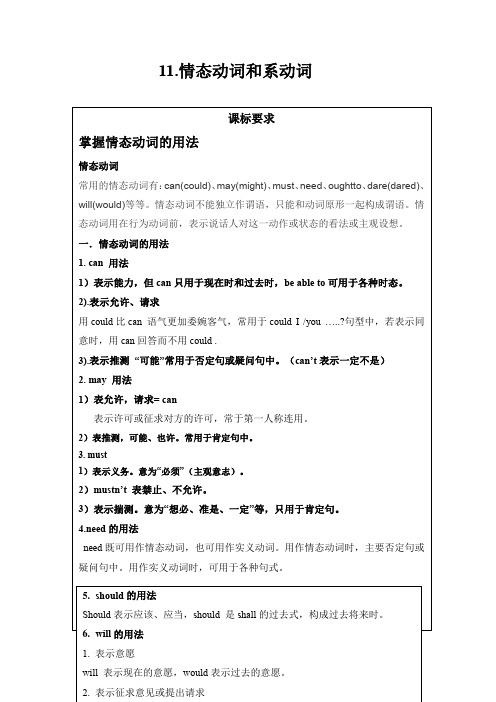
11.情态动词和系动词1.—What _______it be?—It ______ be a mail box, for it is moving .It _______be a car.A. can; can’t; mustB. can; can; mustC. can; mustn’t; mustD.must; mustn’t;can2. —I still haven't found my pet dog.—I'm sorry to hear that. You ________ be very sad.A. canB. shouldC. mustD. will3. —Look at the young lady in red. Is it Mrs.Li?—No. It ________ be her. She is wearing a white dress today.A. mustn'tB. needn'tC. can't4. —Is that man Mr.Zhang?—It ________ be him. He went to Beijing for a meeting yesterday.A. can'tB. mustn'tC. needn't5. —Where are you going this month?—We________ go to Xiamen, but we're not sure.A. needn'tB. mightC. mustD. mustn't6. —Whose bike is this?—I am not sure. It ________ be Mary's.A. shallB. mustC. might7. The girl in the classroom ________ be Sarah. She has gone to the library.A. mayB. mustC. can'tD. needn't8.—Is Tom coming by train?—He ________ drive his car, I'm not sure.A. can'tB. mayC. must9. The sweater________ belong to Jim. It's much too large for him.A. mustn'tB. can'tC. needn't10.—Excuse me, is this the right way to the Children's Palace?—Sorry, I'm not sure. But it ________ be.A. mustn'tB. mightC. can'tD. must11.—What's wrong with Judy? She has been absent for two days.—Oh, she ________ be ill. Let's go to ask Mr. Green.A. mayB. needC. would12. —Do you think that Kobe will be elected as the MVP this year?—It ________ him. He has retired(退役)since April 13.A. can't beB. mustn't beC. must beD. can be13.A good friend is someone you ________ share your pleasure and pain with.A. oughtB. needC. canD. must14. —Mum, ________ I play football this afternoon?—Sure, but you ________ finish your homework first.A. may; couldB. can; mustC. can; mustn'tD. may; can't15. —Mom, I've signed for a big box by SF Express. What's in it?—I'm not sure. It ________ be a present from your aunt.A.might B.must C.should D.will 16. — Mom, must I clean my room now?— No, you ________. You can do it after dinner.A.needn’tB. mustn’tC. shouldn’tD. can’t17. —Is the tall man Mr. Hunt?—It _________ be him. He has gone to Qingdao.A. mustn’tB. needn’tC. can’tD. won’t18. —May I take the magazine out of the reading room?—I’m afraid you _______ . Please read it here.A.can’tB. needn’tC. wouldn’tD. don’t19. —What time is it?—It’s half past six. We go now, or we’ll miss the school bus.A. canB. mayC. mustD. could20.--whose book is this ?--It be Lucy’s. Look, Her name is on the cover.A. canB. mustC. mayD. could21.Jack’s bike is blue, so this yellow one ________ be his.A.mustn’tB.can’tC.couldn’tD.mightn’t22.The guitar ________ belong to Alice. Only she plays the guitar here.A.could B.must C.can’t D.Can 23.—What do you think “upset” mean?—I’m not sure. It ______ mean sad,A.mustB.canC.mightD.can’t24. ---May I go swimming now?--- No, you ____. You must finish your homework first.A. mustn’tB. may notC. couldn’tD. needn’t25. --- Must I finish my homework now?--- No, you ______. You may have a rest first.A. mustn’tB. can’tC. may notD. needn’t26. When I asked her, she tried to avoid me.A. answeredB. answeringC. answerD. to answer27. These books ____ out of the reading room. You have to read them here.A. can’t takeB. must be takenC. can takeD. mustn’t be taken28. —Finally, they came back.—They ________ be hungry after such a long walk.A. can'tB. mustC. needn't29. —I hear you have a home robot.—Yes, it's amazing. It ________ do all my housework.A. mustB. shouldC. couldD. can30. —Hi, madam. Can I take the story books out?—No, my boy. They ________ be taken out of the readingroom. It's a rule.A. mustn'tB. needn'tC. couldn'tD. wouldn't31.—________ I borrow your dictionary?—Sorry. I've left it at home.A. ShouldB. NeedC. MustD. Could32. —Excuse me, sir, visiting hours are over. You ________ leave.—Pardon me, nurse. I didn't hear the bell.A. mayB. canC. mustD. need33. —Shall we take a car?—No, we ________. It's only five minutes' walk.A. can'tB. mustn'tC. needn'tD. couldn't34. —Could I smoke here?—Sorry. I am afraid you ________. Look at the sign “No smoking”!A. couldn'tB. needn'tC. can'tD. won't35. —Hi, you ________ walk on the grass.—Sorry, I ________ do it again.A. can't, willB. needn't, won'tC. mustn't, won't36.This kind of apple ______ delicious. I want one more.A.smellsB.feelsC.tastesD. look37.Oh, the milk ______ strange, do you think it’s OK to drink?A.is tastedB.is tastingC.tastesD.tasted38.his kind of skirt looks ______ and sells ______.A.nice, wellB.nice, goodC.good, goodD.well,well39.The dress ______ very soft. I like it.A.is feelingB.feelsC.is feltD.felt40.The flower smells _____, and I like it very much.A.wellB.goodC.badlyD. bad。
中考英语语法专题详解七:情态动词、系动词

中考英语语法专题详解七:情态动词、系动词专题七情态动词、系动词一、情态动词情态动词本身有一定的意义,但不能独立作谓语,要和动词原形一起构成谓语,表说话人的语气和态度。
它没有人称和数的变化。
常见的情态动词有:1. can表示能力,有“能”“会”的意思;表示可能性,多用在否定或疑问句中;表示请求和许可。
如:The parrot can speak three languages. 这只鹦鹉能讲三种语言。
Can I borrow the book from the library?我可以从图书棺借这本书吗?Shanghai can be very cold in March. 上海三月份可能会很冷。
拓展延伸can还有过去式could 可表“能,会”,又可以和be able to替换,而be able to有更多时态。
如:He could swim when he was four. =He was able to swim when he was four. 他四岁时就会游泳。
在一般疑问句中,can/could 常用来表示请求或征求对方意见,用could 比用can语气更加委婉和客气。
类似用法的还有Will /Would you (please)…等句型。
如:Could you tell me how I can get to the post office? 你能告诉我怎样到邮局吗? Would you please turn up the radio?请你把收音机开大点,好吗?2.may表示“许可”时,相当于can,其否定回答用can’t/mustn’t;表推测时,常用在肯定句中,表“可能”。
如:-May I borrow your ruler?我可以借用您的直尺吗?-No, you can't /mustn't. 不行。
She may be a teacher. 她可能是一名教师。
中考英语情态动词、助动词、系动词专项讲解

中考英语情态动词、助动词、系动词专项讲解中考英语情态动词、助动词、系动词专项讲解语法精讲1.can 和could2.may 和might3.need, must和have to情态动词 4. should和ought to5. shall, will和would6. had better1.can和coul d① can表示能力,意为“能够,可以”,could用于过去时,例如He can finish his homework al one. 他可以单独完成作业的。
He couldn’t cook when he was 18 years old. 他18岁时还不会做饭。
② can表示推测,意为“可能”,在否定句中表示否定的猜测,意为“不可能”,could用于对过去的猜测,can’t be 不可能例如:He could be cooking at this time yesterday. 他昨天这个时候有可能正在做饭。
He can’t be here be cause he has gone to American.他不可能会在这里,因为他已经去美国了。
③ can表示请求语气,coul d的语气更委婉,例如:Can I help you? / Coul d I help you? 有什么我可以为您效吗?拓展:be abl e to=can也为“能够”,用来表示能力(有人称和时态的变化)例如:He is able to d eal with this problem. 他能解决这个问题的。
2.may和 might① may表示请求,might语气更委婉,例如:May I help you?Might I sit here?② may表示肯定的推测,语气比can更弱,might对过去的推测例如:Mary may be doing her homework now.May can be doing her homework now. can表达的推测语气比may更强,更有把握。
- 1、下载文档前请自行甄别文档内容的完整性,平台不提供额外的编辑、内容补充、找答案等附加服务。
- 2、"仅部分预览"的文档,不可在线预览部分如存在完整性等问题,可反馈申请退款(可完整预览的文档不适用该条件!)。
- 3、如文档侵犯您的权益,请联系客服反馈,我们会尽快为您处理(人工客服工作时间:9:00-18:30)。
3.will和would的用法 (1)will表示“意志”,“意愿”,用于各人称。 We will help her if she asks to us. 如果她问我们,我们就愿意帮助她。 在疑问句中用于第二人称,表示询问对方的意愿或向对方提出请求。 Will you please give him a message when you see him? 当你看见他时,给他稍个信好吗?
系动词(即连系动词)用于连接主语和表语,说明主语的 状态,性质,特征或身份。表语通常由名词、形容词,或
相当于名词或形容词的词或短语等充当,说明主语是 什么或怎么样。
实义动词包括及物动词和不及物动词,可单独做谓语,主要说
明主语的行为或者动作。
系动词?
• 连系动词(即系动词)用于连接主语和表语,说明主语的状 态,性质,特征或身份。表语通常由名词、形容词,或相当 于名词或形容词的词或短语等充当,说明主语是什么或怎么 样。
6.need的用法 (1)need作情态动词时,表示“需要”,主要用于否定句或疑问句中。其否定形式为needn’t,表示 “没有必要,不必”。 (2)回答need提问的答语 ①肯定回答:Yes,…must. ②否定回答:No,…needn’t. —Need we do some cleaning now?我们需要现在大扫除吗? —Yes, you must. 是的,你们必须。 —No, you needn’t. 不,你们不必。 (3)need 还可作实义动词,常用于“need to do sth.”结构。 I need to learn more. 我需要学习更多知识。
D. passed
2. The traffic lights_____ green and I pulled away.
A. came B.grew
C. got
D. went
3.I am afraid the weather will ____ hot for a few days.
st B.be lasted C.stay D.be stayed
strong, tall, thick, healthy etc.
come get/ become
get lost ,get ill
fall
表事物的发展转向好的状态 常用来指人或物的状态的变化
表由动态到静态的转变
all right, true, alive etc. become 接名词时,名词前接冠词 He has become an excellent actor.
remain
His brother has become an engineer while he remains a worker.
+ N.
The weather still remained cold in April.
+ Adj.
When I returned, she remained sitting there.
ill, sick, silent, asleep etc.
表达“到达或超过(某一年龄或时间)”, 用turn 不用become
Eg. My son turns 3 in August. It’s turned midnight.
turn +单数名词 become a/an + 单数名词
成为一名…
6. He remained ______ though we repeatly asked him to sit down.
A. stand B. to stand C. stood
D. standing
7.The true author of the book remains _____.
A.know B. to know C. unknown D. knowing
语法专题(九) 系动词和情态动词
【中考考点】 (1)系动词be, look, smell, get, become, turn, keep等的基本用法。 (2)情态动词can, must, need, may等的基本用法及辨析。
考点一 系动词
系动词不能独立作谓语,必须与表语一起构成谓语,称作“系表结构”,说明主 语的状态、性质、特征或身份。
• She looks much younger in her red dress. • The population growth in China remains a problem. • The book lay open on the desk. • I thought it was a pig, but it proves a cat. • He has become an excellent actor. • He has turned excellent actor.
remain
+to do
remain + n.
remain + adj.
remain + v-ed / ing remain + prep. phrase remain + to do sth.
考点二 情态动词
情态动词表示说话人对某一动作或状态的态度,表示“可能”、“应当”、“必 要”等含义,但其本身词义不完全,不能独立作谓语,必须和动词原形连用。情态动 词没有人称和数的变化。其否定形式一般是在情态动词后加not (have to除外)。 情态动词数量不多,但用途广泛,主要有can (could), may(might), must, need, shall (should), will (would)等。
4.He turned ____ ten years ago but later he became ____.
A. a teacer;a doctor
5.The dog ___ lost yesterday.
A.got B.became C.turned D.fall
用法
习惯搭配
多指朝坏的方面变化,也常与表颜色的词连用 wrong, bad, mad, hungry, blind etc.
turn grow
表 “颜色,气味,天气,职业,年龄,时间”等 表成长,发展中的变化
1特殊用法,可接年龄和时间 2 接单数名词时,单数名词前不接冠词 He has turned excellent actor.
5.must的用法 (1)must 意为“必须,一定,准是”,表示说话人认为必须做某事,命令、要求别人做某事以及对某事的肯定推测。 [注意] must 和 have to 的区别: must 表示说话人的主观意愿;have to 表示客观需要。 I must do my homework first.我必须先做家庭作业。 It is raining hard outside; I have to stay at home. 外面雨下得很大,我不得不待在家里。 (2)回答must提问的答语 ①肯定回答:Yes,…must. —Must I go home now?我必须现在回家吗? —Yes, you must. 是的,你必须现在回家。 ②否定回答:No,…needn’t./No,…don’t/doesn’t have to. —Must I go home now? 我必须现在回家吗? —No, you needn’t/don’t have to . 不,你不必。
情态动词:情态动词表示说话人对某一动作或状态的态度,
表示“可能”、“应当”、“必要”等含义,但其本身词义不完 全,不能独立作谓语,必须和动词原形连用。
注意:1.情态动词后加动词原形. 2.情态动词没有人称和数的
变化。 3.其否定形式一般是在情态
动词后加not (have to除外)
• 1. can/could • 2. may/might • 3. will/would • 4. shall/should • 5. must/ have to • 6. need/dare(敢)
2.may和might的用法 (1)表示请求时,might比may语气更为委婉。 —Might/May I come in? 我可以进来吗? —Yes, of course you may.当然可以。 (2)回答may提问的答语 ①肯定回答:Yes,…may. ②否定回答:No,…mustn’t/can’t. (3)表示没有把握的推测时,might表示的可能性比may小。 The child may get home already. 那个孩子可能已经到家了。 She might win the prize. 她有可能得奖。 (4)may放在句首,表示祝愿。 May you be happy.祝你开心。
2)should have done表示过去应该做而实际上没有做的事, 而shouldn’t have done表示过去不应该做而实际上已经做了的事。 It’s eleven o’clock. He should have arrived here by now. You shouldn’t have told anyone about that. 你本不该告诉任何人关于那事。
I would like to go with you tonight.
4.shall和should的用法 1)shall 用于第一人称的句子中,表示提建议或请求; should用于各种人称的句子中,强调义务或责任。
Shall we go out for a walk? 我们出去散步好吗?(建议) You should study hard at school.你(们)在学校应该努力学习。(劝告)
1.can和could的用法 (1)can表示能力,意为“能,会”。还可表示怀疑、猜测,常用于否定句或疑问句中,也可表示可能性。 could是can的过去式,表示过去的能力。 Anybody can make mistakes. 任何人都可能会犯错误。 He can’t be Tom. 他不可能是汤姆。 She could swim when she was seven years old. 她七岁时就会游泳。 2)could也可用于现在时,表示委婉地提出请求、建议等,回答时用can。 —Could you show me the way to the hospital? 你能告诉我去医院的路吗? —Of course I can.当然可以。 (3)回答can提问的答语 ①肯定回答:Yes, …can.②否定回答:No,…can’t. [注意] be able to也表示“能”,可用于各种时态。 他下周会去那里。 He will________________ go there next week.
